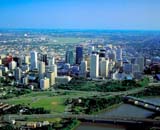|
| |
|
| Canada |
 |
| Courses offered |
| The Bachelors Degree: |
| Bachelors degree of four years in (Arts, Philosophy, Sociology, Psychology, Computer, Nursing, History, Hospitality, Engineering, Fine Arts) and more than 60 specializing courses are been offered in the Canadian universities. |
| The Master’s Degree: |
| After completing of three to four years of Bachelors degree, The Masters degree can be obtained from the university for One or Three. Time required is dependent on the field of study and Specialization of the course taken. There are several types of Master's degrees offered by the Canadian universities for foreign students (Masters in Arts, Masters in Human Recourses, Masters in Education, Masters in Business Administration, Masters in Hospitality, Masters in Science). |
|
|
| The Ph.D. (Doctor of Philosophy): |
| Doctorate Degree can be obtained by for Three years after completing the Masters degree. It is a study of original research to be conducted and written up in the form of a dissertation and the defense of that research orally. |
| Test Required |
This section provides information about GRE, GMAT, SAT, TSE, IELTS and TOEFL.
The above mentioned tests are applicable depending on the type of courses candidate obtains. |
| Universities and Colleges |
| There are more than 200 Universities across Canada, provides various courses and degree for foreign students. |
| |
Top Universities In Canada
|
| Acadia University |
| University of Alberta |
| Athabasca University |
| Augustana University College |
| Bishop's University |
| Brandon University |
| Brescia University College |
| The University of British Columbia |
| British Columbia Open University |
| Brock University |
| The University of Calgary |
| Campion College |
| University College of Cape Breton |
| University College of the Cariboo |
| Carleton University |
| Concordia University |
| Concordia University College of Alberta |
| Dalhousie University |
| Emily Carr Institute of Art and Design |
| University College of the Fraser Valley |
| University of Guelph |
| Huron University College |
| University of Sudbury |
|
|
| Cost of Education |
| These costs will vary depending on the course or institution. Therefore, average costs are provided below and should only be used as a guide. Institutions will advise when to pay your tuition fees and acceptable methods of payment. |
| Province |
| Undergraduate tuition fees for the academic year (International students) Approx |
Graduate tuition fees for the academic year (International students) Approx |
| British Columbia |
$4,304 - $15,480 |
$4,000 - $17,325 |
| Alberta |
$5,983 - $10,364 |
$4,416 - $19,200 |
| Saskatchewan |
$7,170 - $9,701 |
$5,313 - $7,170 |
| Manitoba |
$5,004 - $6,630 |
$5,435 - $9,685 |
| Ontario |
$6,082 - $12,666 |
$5,174 - $26,000 |
| Quebec |
$8,868 - $10,188 |
$4,961 - $20,000 |
| New Brunswick |
$6,540 - $ 9,960 |
$5,230 - $8,216 |
| Nova Scotia |
$6,882 - $11,718 |
$4,065 - $14,800 |
| Prince Edward Island |
$7,270 |
$5,947 |
| Newfoundland |
$6,660 |
$3,000 - $6,000 |
|
| Working during study |
| Students may work on the campus of the publicly funded post-secondary institution at which they are enrolled on a full-time basis without an employment authorization.
Students are permitted to work part-time of 20 hours a month during the course time and full time during vocations with good payouts as the living cost is affordable in Canada |
| Work Permit after study |
| Students will be given minimum of One year work permit in Canada after completing minimum One year education in Canada with flexible extended work permit and apply for Permanent Residential Status in Canada. |
| |
|


